Abstract
At present, health education supposes and imposes general acceptability, mutual respect, information, means for understanding of different sanogenic habits, cooperation, constituting a human right, but also an obligation for the society, embodied in an integrated curriculum, covered in practice at all school levels. In fact, the curriculum for Health Education should aim at educating the school population for a healthy lifestyle, facilitating the access to relevant and accurate information, performing an indirect adult education and leading to a reduction in the number of illnesses and health-related behaviors. Practically, health education plays three major roles: (a) preventive - its specific themes contain issues related to the education of population, concerning the prevention of illnesses; (b) constructive - in order to achieve the public adhesion in the favor of health; (c) curative - with the view to educate and persuade the patients to follow correctly the medical prescriptions. In formal and non-formal scholar activities, nutrition education - as health education branch - is based on educational messages, relevant images and videos, practical demonstrations, meetings with experts or case-studies. This paper underlines on the feedback expressed by 108 university students - future specialists in food engineering and related fields - concerning the importance of health /nutrition education for human wellbeing. The questioned students answered to several points that tested their knowledge regarding health / nutrition education. The research was made in the frame of the Erasmus+ project entitled “Raising the Awareness of the Triad Nutrition - Health - Food Safety in School Education”.
Keywords: Erasmus+ projectfood sciencehealth educationnutrition educationstudents’ feedback
Introduction
Education is strongly connected to health and to determinants of health - health behaviors, risky contexts and preventative service use -, being a crucial mechanism for enhancing the health and well-being of individuals (Feinstein, Sabates, Anderson, Sorhaindo, & Hammond, 2006). With this consideration, Health Education becomes an important component of lifelong learning, seeking to optimize the health status and to prevent or reduce the diseases at individual and community level, by influencing knowledge, opinions, attitudes, and behavior of those who are in key-positions and considered as models - policy makers, local authorities, healthcare professionals -, and the community as a whole. Practically, Health Education can be easily considered like a dynamic system that includes the forming of a consciousness of health, the measure in which the teaching and learning process is oriented on its promoting, and the active participation of stakeholders and community to make known of its great importance. Without doubts, it represents a part of the cultural life of each country and hardly can be delimited by the social level with which it is closely dependent (Ciobanu, 1995). On the other hand, the roles assumed by Health Education are coming in-line with the actual health status and behaviors of 21st century people: preventive, constructive and curative.
The preventive role addresses the actions that aim to diminish the risk factors associated to various diseases. Here, the education of a massive amount of population concerning the prevention of illnesses is crucial, being subordinated in Romania to several strategies for health promotion and health education derived from specific studies on population health (Neculau & Rogozea, 2014). However, such approaches are subjects to several criticisms: the prevention aims at combating risk factors, being dominated in terms of coordination and decision-making by experts or specialists, while the beneficiaries or the population are not stimulated to participate actively, neglecting so the positive health dimension. But considering this preventive role, the school can contribute in an important way to the education of young students, by summarizing and valorizing the philosophy of healthcare expressed in an old Latin syntagma: “mens sana in corpore sano” (Marinescu, 2015).
As constructive role, Health Education must have as much population as possible near its principles and actions, sustaining a good quality of life and a proper status of well-being, and providing protection against unhealthy behaviors. Those attributes which are strongly related to a healthy lifestyle, contribute to empowering individuals and the community to make a better account of their own health. This can be a tangible approach, even there are recorded in Romania, rural-urban differences in access to health care, seen as a major problem, requesting so measures that must been implemented in order to improve the citizens’ access to care (Vlădescu, Scîntee, Olsavszky, Hernández-Quevedo, & Sagan, 2016).
The curative role of Health Education addresses the patients and tries to educate them to be rigorous with their medical prescriptions.
Taking into consideration its abovementioned roles, raising the awareness of citizens concerning the importance of health education is essential: it reduces the need for health care, the associated costs of dependence and human suffering. More, it helps to promote and sustain healthy lifestyles and positive choices, but also to sustain human development and human relationships (Feinstein et al., 2006).
Problem Statement
As an important branch of Health Education, and fully exploiting its prevention role, nutrition education represents a component which has as central objective to provide relevant information in order to make known correct dietary habits and food choices (Sachithananthan, Buzgeia, Awad, Omran, & Faraj, 2012). It is obvious that nutrition plays an essential role in maintaining lifelong health, an unbalanced diet having an important role in the development of many diseases: obesity, type 2 diabetes, cardiovascular disease, dental disease, anorexia and bulimia. Unfortunately, the expectations seem to be tragic: in 2020, the morbidity due to chronic food-borne illnesses will increase to 57% worldwide, with a mortality rate of about 75% of all deaths (Constandache & Nenciu, 2013). By sure, those figures are not meant to let the health decision makers very happy. But there are solutions: nutrition education can work on prevention, especially by acting on the modifiable risk factors, mainly on the eating habits. The school, in formal and non-formal educational settings, can easily motivate the students to have healthy eating habits and to develop a balanced lifestyle, through prevention actions that help them to grow up correctly and naturally, becoming aware in this sense of the pathological implications of food imbalances. Dietary changes have major effects in the short term and lead to significant improvements in long-term health. As example, in Romania, the consumption of fruits, vegetables, fish, milk and dairy products are lower than nutritional recommendations, determining a lower contribution for some necessary nutrients (potassium, calcium, vitamin D, polyunsaturated fatty acids), producing enough reasons to be concerned about the population health status (Constandache & Nenciu, 2013). In this respect, schools represent the ideal setting for nutrition education due to the fact that they reach most youth, and also the nutrition fits perfectly into several subject areas, starting with general science, continuing to biology, health education and consumer science (Story, Lytle, Birnbaum, & Perry, 2002). This means, by sure, good, well prepared and dedicated teachers, but also investments in education, food policies and urban physical infrastructure (Willett et al., 2006).
Research Questions
It is obvious that the prevention of the 21st century diseases claims changes in the students’ behaviours related to their diet or consistent physical activity. But how much knowledge and skills have our young students regarding health education / nutrition education? Are they aware of its importance? Do they know enough on making healthful food choices, but also on developing lifelong healthy eating patterns? Near those questions, practically the researchers tried also to ascertain whether the topics proposed for the continuous professional training program dedicated for primary and secondary teachers “Modern Approaches in Health Education” (Voicu, Gorghiu, Anghel, & Buruleanu, 2015) are helpful and bring the necessary knowledge for teachers to design modern and interesting lessons for their students.
Purpose of the Study
The purpose of this study is to try to make a capture of the current knowledge of the university students related to the importance of nutrition education for human well-being, but also for their actual and future life. The students’ answers - part of them being included in this study - can offer a real help for designing a proper curriculum for nutrition education, or for the integration of its topics into adjacent subject areas or disciplines (science, health education, consumer science). More, considering the low number of teacher training programs on health education, the students’ feedback, considerations and observations can constitute an important starting point for drawing the necessary lines to prepare successful interventions in classrooms.
Research Methods
Aiming to offer an image concerning the university students’ level of awareness of health education / nutrition education for the human wellbeing and for their personal lives, a research was conducted involving university students (19-23 years old), from Valahia University Targoviste, Romania, enrolled in specialisations which have as main directions food processing and related processes and products control. The methodology proposed for the research relied on the administration and processing of a questionnaire with ten items, each of them proposing possible answers, grouped according to a five-steps scale: “Not at all”, “Very little”, “Moderate”, “Much”, “Very much”. 108 students expressed their opinions, participating voluntarily to this research. All of them were informed on the research targets and received information concerning the way in which the research has been projected.
Findings
Health Education has as an important objective the empowering of individuals and community groups about their own health, becoming the responsibility of each individual. More, health promotion is more relevant today than ever in addressing public health problems (Kumar & Preetha, 2012). Starting from those statements, the questioned students were invited to expressed their knowledge, thoughts and feelings in strong relation to health education in general, and nutrition education in particular.
Figure
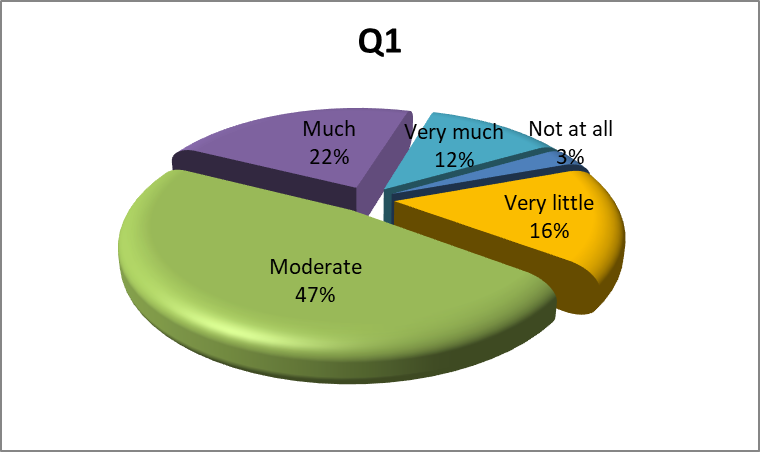
Figures
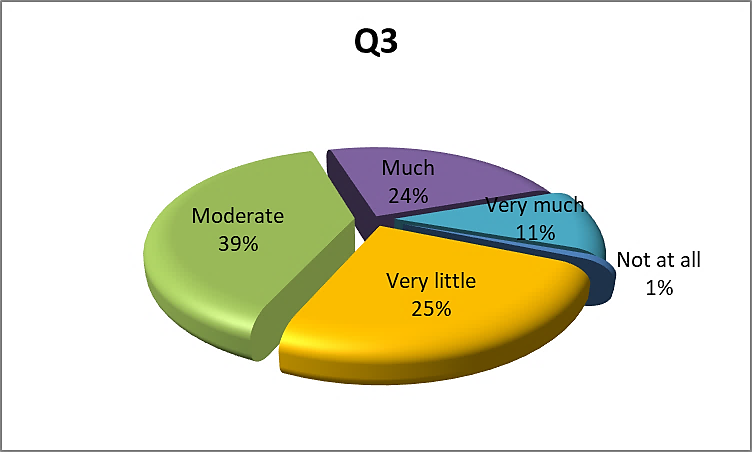
Figure
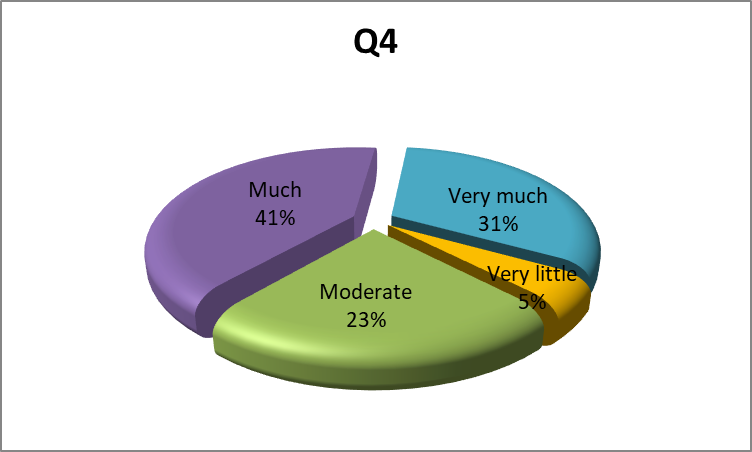
Figure
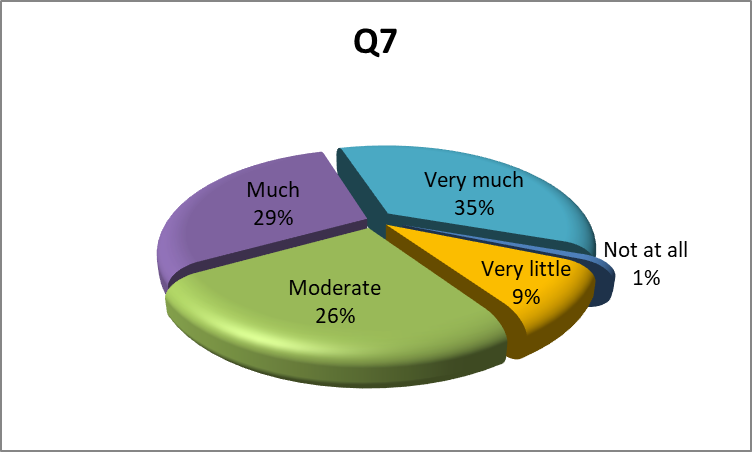
Figure
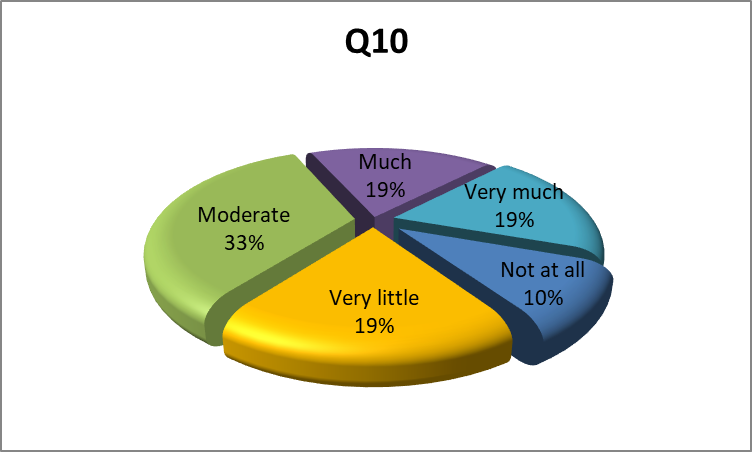
Other questions targeted to find the students’ position related to the consumption of junk food or sweet carbonated beverages. A gratifying feedback was recording here - a big part of the questioned students (three quarters of them) knew the problems that such foods or beverages can make to their heath. However, they admitted that it is very hard to let those away, but they tried to limit the consumption.
Conclusion
It is obvious that all the citizens have to understand the importance of a healthy lifestyle and the major role that healthy foods play for the health status. In this sense, Health Education in general, and nutrition education in particular, should become a priority for the Romanian educational system. Several steps have been already made: starting with 2004, an optional frame dedicated to Health Education is available, covering both primary and secondary education. More, discussions are on the role to propose this discipline as a compulsory one. By sure, eating in an adequate mode, properly and healthy, represents a responsible act that have to be taught since the early childhood. Here, the school should contribute to the development of personal health and to promote healthy behaviors but also to strengthen the position of the students as active participants in health education. More and more students become aware of the great importance played by the health education for their lives and for maintaining a constant healthy status. Their teachers have major responsibilities in this respect. The approaches in the area of Health Education must be made from the scientific, pedagogical and legislative point of views. The teachers can use and harmonize relevant information adapted for each level of education, taking into account the students’ level, their psychosomatic development and local peculiarities and necessities.
Acknowledgments
The paper capitalizes some of the results obtained in the ERASMUS+ project - Strategic partnerships - code: 2014-1-RO01-KA200-002931 - “EduForHealth - Let’s make it better! Raising the awareness of the triad nutrition-health-food safety in school education”, funded with the support of the Erasmus+ programme of the European Union. The European Commission support for the production of this publication does not constitute an endorsement of the contents which reflects the views only of the authors, and the Commission cannot be held responsible for any use which may be made of the information contained therein.
References
- Anghel, G.A., Gorghiu, G., Buruleanu, C.L., & Gorghiu, L.M. (2017). Education for Healthy Eating in the Actual Curricular Context - A Case Study. Journal of Science and Arts, 41(4), 815-822.
- Ciobanu, V. (1995). Educația pentru sănătate - factor important în promovarea sănătății. Medicina familiei, 2(4), 1-7. Available on-line at: http://www.medfam.ro/mf/mf/mf4/educ_san.html
- Constandache, M., & Nenciu, D.S. (2013). The Structure of Romanian’s Food Consumption and Its Implications on Health Condition and Quality of Life. Revista Română de Statistică, 12, 41-51.
- Feinstein, L., Sabates, R., Anderson, T., Sorhaindo, A., & Hammond, C. (2006). Measuring the Effects of Education on Health and Civic Engagement. Proceedings of the Copenhagen Symposium, Paris, Chapter: What Are the Effects of Education on Health?, 1, 171-354. Available on-line at: http://www1.oecd.org/education/innovation-education/37425753.pdf
- Kumar, S., & Preetha, G. (2012). Health Promotion: An Effective Tool for Global Health. Indian Journal of Community Medicine: Official Publication of Indian Association of Preventive & Social Medicine, 37(1), 5-12, doi:
- Marinescu, M. (2015). Romanian Students’ Perception over the Optional Curriculum Healthcare Education. Procedia Social and Behavioral Sciences, 191, 2034-2039.
- Neculau, A.E., & Rogozea, L. (2014). From Health Education to Health Promotion in Romania - A Historical Perspective. Public Health and Management, 2(4), 176-177.
- Sachithananthan, V., Buzgeia, M., Awad, F., Omran, R., & Faraj, A, (2012). Impact of Nutrition Education on the Nutritional Status. Nutrition & Food Science, 42(3), 173-180, doi:
- Story, M., Lytle, L.A., Birnbaum, A.S., & Perry, C.L. (2002). Peer-led, School-based Nutrition Education for Young Adolescents: Feasibility and Process Evaluation of the Teens Study. The Journal of School Health, 72, 121-127, doi:
- Vlădescu, C., Scîntee, S.G., Olsavszky, V., Hernández-Quevedo, C., & Sagan, A. (2016). Romania: Health System Review. Health Systems in Transition, 18(4), 1-170.
- Voicu, C.D., Gorghiu, G., Anghel, G.A., & Buruleanu, C.L. (2015). Considerations Related to Specific Topics of Food Science in School Education. Procedia Social and Behavioral Sciences, 205, 321-328, doi:
- Willett, W.C., Koplan, J.P., Nugent, R, Dusenbury, C., Puska, P., & Gazianoet, T. (2006). Prevention of Chronic Disease by Means of Diet and Lifestyle Changes. In D.T. Jamison, J.G. Breman, A. R. (Eds.), Disease Control Priorities in Developing Countries (pp.10-50) . Washington (DC): The International Bank for Reconstruction and Development / The World Bank. Available on-line at: https://www.ncbi.nlm.nih.gov/books/NBK11795/, co-published by Oxford University Press, New York.
Copyright information

This work is licensed under a Creative Commons Attribution-NonCommercial-NoDerivatives 4.0 International License.
About this article
Publication Date
09 April 2019
Article Doi
eBook ISBN
978-1-80296-059-4
Publisher
Future Academy
Volume
60
Print ISBN (optional)
-
Edition Number
1st Edition
Pages
1-1062
Subjects
Multicultural education, education, personal health, public health, social discrimination,social inequality
Cite this article as:
Gorghiu, G., & Buruleanu, C. L. (2019). Food Science Students’ Knowledge And Attitudes Related To Health Education. In E. Soriano, C. Sleeter, M. Antonia Casanova, R. M. Zapata, & V. C. Cala (Eds.), The Value of Education and Health for a Global, Transcultural World, vol 60. European Proceedings of Social and Behavioural Sciences (pp. 391-398). Future Academy. https://doi.org/10.15405/epsbs.2019.04.02.50

